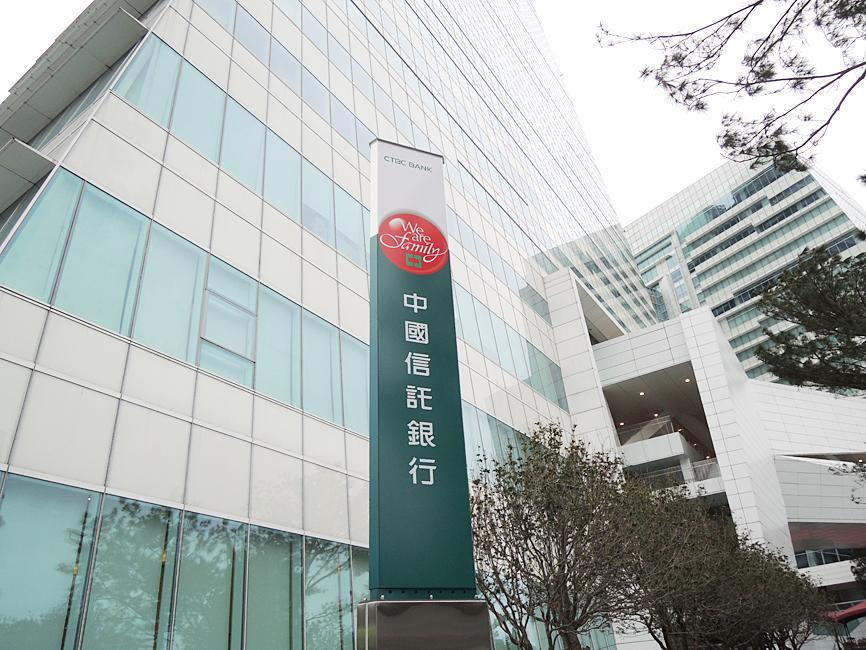CTBC Financial Holding Co (中信金控) on Friday said that its net profit last month halved from a year earlier to NT$3.71 billion (US$133.33 million) as income from cash dividends was delayed after the nation’s listed companies were ordered to postpone their annual shareholders’ meetings due to a COVID-19 outbreak, the company said.
The financial conglomerate’s life insurance arm, Taiwan Life Insurance Co (台灣人壽), saw its net profit decline 55 percent from NT$5 billion a year earlier to NT$2.25 billion last month.
Cash dividends usually make up a large portion of life insurance companies’ net income in the third quarter, when many listed firms distribute cash dividends.

Photo: Lee Chin-hui, Taipei Times
The Financial Supervisory Commission required listed firms to postpone their shareholders’ meetings from June to last month or this month, CTBC said.
CTBC Bank’s (中國信託銀行) net profit declined 8.8 percent annually to NT$2.42 billion last month, also weighing on its parent company’s bottom line.
In the first seven months of this year, Taiwan Life’s net profit totaled NT$18.82 billion, up 43 percent year-on-year, and CTBC Bank’s net profit reached NT$17.3 billion, up 7 percent from a year earlier, company data showed.
From January to last month, fee income from CTBC Bank’s wealth management operations rose by double-digit percentages due to its diverse products and digital services, while the first-year premiums generated by Taiwan Life grew more than 30 percent from a year earlier, CTBC Financial said.
Overall, the financial conglomerate’ net profit rose 40 percent annually to NT$37.1 billion during the period, it said.
CTBC Financial’s earnings per share were NT$1.85 in the first seven months.
Taishin Financial Holding Co (台新金控) yesterday reported that its net profit grew 4 percent annually to NT$1.72 billion last month, while its banking unit, Taishin International Bank (台新銀行), reported a 5 percent gain in net profit to NT$1.38 billion, it said.
The bank maintained good loan quality amid the COVID-19 pandemic, with its non-performing loan ratio standing at 0.12 perfect, the company said.
Its newly acquired life insurance unit, Prudential Life Insurance Co of Taiwan (保德信人壽), which is to be renamed Taishin Life Insurance Co (台新人壽), made a net profit of NT$300 million, up 15 percent from a year earlier, it said.
Meanwhile, SinoPac Financial Holdings Co (永豐金控) said its net profit expanded 22 percent annually to NT$1.72 billion last month, when Bank SinoPac (永豐銀行) and SinoPac Securities Co (永豐金證券) both reported growth in net profit.
In the first seven months, SinoPac Financial’s cumulative net profit totaled NT$10.3 billion, up 45 percent from a year earlier, it said.

Taiwan’s technology protection rules prohibits Taiwan Semiconductor Manufacturing Co (TSMC, 台積電) from producing 2-nanometer chips abroad, so the company must keep its most cutting-edge technology at home, Minister of Economic Affairs J.W. Kuo (郭智輝) said yesterday. Kuo made the remarks in response to concerns that TSMC might be forced to produce advanced 2-nanometer chips at its fabs in Arizona ahead of schedule after former US president Donald Trump was re-elected as the next US president on Tuesday. “Since Taiwan has related regulations to protect its own technologies, TSMC cannot produce 2-nanometer chips overseas currently,” Kuo said at a meeting of the legislature’s

TECH WAR CONTINUES: The suspension of TSMC AI chips and GPUs would be a heavy blow to China’s chip designers and would affect its competitive edge Taiwan Semiconductor Manufacturing Co (TSMC, 台積電), the world’s biggest contract chipmaker, is reportedly to halt supply of artificial intelligence (AI) chips and graphics processing units (GPUs) made on 7-nanometer or more advanced process technologies from next week in order to comply with US Department of Commerce rules. TSMC has sent e-mails to its Chinese AI customers, informing them about the suspension starting on Monday, Chinese online news outlet Ijiwei.com (愛集微) reported yesterday. The US Department of Commerce has not formally unveiled further semiconductor measures against China yet. “TSMC does not comment on market rumors. TSMC is a law-abiding company and we are

FLEXIBLE: Taiwan can develop its own ground station equipment, and has highly competitive manufacturers and suppliers with diversified production, the MOEA said The Ministry of Economic Affairs (MOEA) yesterday disputed reports that suppliers to US-based Space Exploration Technologies Corp (SpaceX) had been asked to move production out of Taiwan. Reuters had reported on Tuesday last week that Elon Musk-owned SpaceX had asked their manufacturers to produce outside of Taiwan given geopolitical risks and that at least one Taiwanese supplier had been pushed to relocate production to Vietnam. SpaceX’s requests place a renewed focus on the contentious relationship Musk has had with Taiwan, especially after he said last year that Taiwan is an “integral part” of China, sparking sharp criticism from Taiwanese authorities. The ministry said

US President Joe Biden’s administration is racing to complete CHIPS and Science Act agreements with companies such as Intel Corp and Samsung Electronics Co, aiming to shore up one of its signature initiatives before US president-elect Donald Trump enters the White House. The US Department of Commerce has allocated more than 90 percent of the US$39 billion in grants under the act, a landmark law enacted in 2022 designed to rebuild the domestic chip industry. However, the agency has only announced one binding agreement so far. The next two months would prove critical for more than 20 companies still in the process